
By Steven A. Simak

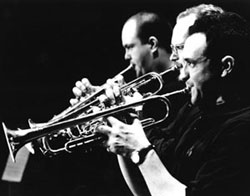
Rigorous musical training, an accomplished faculty, and an exciting roster of performances ranging from opera to jazz. These elements are just part of the Brooklyn College Conservatory of Music - one of New York's leading institutions for the training of musicians. Nancy Hager, director of the Conservatory, summarizes their mission in three primary objectives. "First, we want to provide the best training we can for the music majors in the program including a solid foundation in the traditions of Western concert hall music as well as significant exposure to other kinds of music - vernacular music, world music, particularly music of American tradition: jazz, musical theater and the different ethnic traditions that are part of the American musical landscape." "Our second objective," she continues, "is to provide meaningful courses and experiences for students who are not music majors. We offer a course in the Core Curriculum (Core Studies 2.2 Introduction to Music) and some post-core electives and that's a very important part of what we do. We also offer performances on campus and opportunities for qualified students who may not be music majors but may have played an instrument or sung in a chorus to join the ensembles." "Lastly, our goal is to provide high quality musical performances for the community - not just people on the campus - but people from the surrounding area and from the schools who come to hear opera, chamber music, symphonic music, the Jazz Ensemble, choral music and so on. It's built into the curriculum but it is also community outreach." 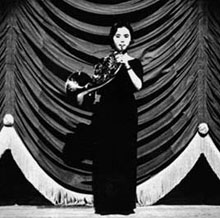
The Conservatory offers more than 150 performances a year on the Brooklyn College campus. Highlights of this past semester include fully-staged performances of Mozart's opera, "Cosi fan tutte", presented in Whitman Theater with the Conservatory Orchestra; a celebration of the "Gershwins at 100" presented in cooperation with the Institute for Studies in American Music; student compositions showcased in both a Composer's Concert and with the Brooklyn College Chorus; an outdoor performance of the BC Jazz Ensemble on the quad, and special concerts for school children by the Conservatory Wind Ensemble. In a dizzying schedule of performances in the spring of 1999, several special events stand out. In March of 1999, the BC Opera Theater will present the famous trilogy of one-act operas - dubbed "Il trittico" by Giacomo Puccini: "Il tabarro", "Gianni Schicchi" and "Suor Angelica". The production will be sung in Italian, with English translation projected above the stage via the Performing Arts Center's new "supertitling" system. In May, the Conservatory Orchestra will showcase student soloists in a concert that will also feature the Brooklyn College Chorus in the beautiful Mozart "Requiem". A concert of new works by student composers is performed each semester, as is a concert of electroacoustic music which features new music created at internationally-renowned computer music centers, including Brooklyn College's own Center for Computer Music. Performances are held at the Brooklyn College Center for the Performing Arts, which houses the 500-seat George Gershwin Theater, the 2,500-seat Walt Whitman Auditorium, the 170-seat Sam Levenson Recital Hall, and a Workshop Theater. All concerts are open to the public as well as the BC community and tickets are free or available at minimal cost ($5 to $10). The Conservatory of Music offers both undergraduate and graduate programs of study. At the undergraduate level, students can earn a Bachelor of Arts in music; a Bachelor of Arts in music education or a Bachelor of Music in composition. The Bachelor of Arts degree program includes courses in ear training, harmonic and contrapuntal techniques, analysis, history, and performance. In addition to these courses, students in the Bachelor of Music degree program concentrate in either composition or performance. At the graduate level, students can pursue a Master of Arts with a concentration in musicology or performance practice; a Master of Music degree with a concentration in composition or performance; or a Master of Arts degree in teacher education. The Conservatory houses a number of significant facilities for study and training in music. These include the Walter W. Gerboth Music Library, the Institute for Studies in American Music, the Recording and Technology Program and the Center for Computer Music. With such a rich variety of degree options and facilities, students majoring in music can select a program that best meets their academic and career goals. 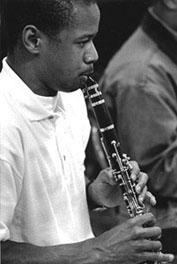
The majority of music majors studying at the Conservatory are in the performance program. Students enrolled in this track receive comprehensive, rigorous training that begins their freshman year. "Our students begin right at the outset and take quite a heavy course load," explains Professor Hager. "The performance and composition undergraduate major is just over 70 credits and the courses in that curriculum bear a very low number of credits for a tremendous amount of work. Orchestra, for example, is a one credit class. The students who are playing orchestral instruments will take orchestra every semester they are here. They rehearse on a regular basis for about 5 hours per week and they practice outside of that. There are always additional rehearsals and concerts and they are supposed to be practicing at least 4-5 hours per day. So it takes a very heavy toll; it has to be a very big commitment. Someone who feels casually about it is not going to be able to stick it out over the four years." Performance is a fundamental part of all the Conservatory's programs. All music majors, regardless of area of concentration, participate in a variety of ensembles. In addition to the musical training, the ensembles also serve to gradually introduce students to the pressures of performing in public. In addition to a variety of chamber music groups that are set up each semester, performance opportunities include the following ensembles:
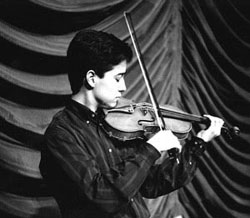
As part of the grading process, every semester performance majors must play a selection of memorized music for a jury of faculty. "It's like a final exam in front of performance faculty and the students are graded on it," explains Hager. "It's pretty nerve racking - you really have to be prepared to play about 40-minutes of music. Several of the areas of the program also have weekly repertory classes. The piano students, for example, will meet on Mondays and will perform and critique each other. It's a way of beginning - getting students up in front of a group and performing...The composition students have their compositions performed publicly and they hear what succeeds and what doesn't. So they receive not only their professor's feedback but their own analysis of their works when their pieces are performed. Something on paper that looks really neat and very clever maybe not come through when it's performed. We also have regular workshops where a professional will come in as a guest speaker and talk about preparing for an audition or writing up a resume - the kind of things that you don't always think about in terms of presenting yourself and making a good impression." As Hager points out, performance is not the only option for students interested in careers in music. Graduates of the program are employed in a wide variety of positions within the music industry and the teaching profession. Music Education, in particular, is undergoing a welcome resurgence due to the re-appropriation of funds for arts education in the public schools. "When I first came to Brooklyn College in the early 1970's," recalls Hager, "we had a huge Music Ed program. There were at least 4 full-time faculty lines in Music Education and many very gifted students were planning to go teach in the schools, but with the elimination of music programs it became a less attractive career option. The situation is quite different now because of Project ARTS - which is a Board of Education Mayoral initiative to re-institute music and art in the public schools. Over the next couple of years they are anticipating hiring several hundred music teachers. I don't know where they are going to come from because I don't believe there are several hundred licensed, well trained music teachers in the area." In response to this need, the Conservatory conducted a search last year and hired Music Education specialist Jane Palmquist to review and revise the Music Education curriculum. "Our hope," says Hager, "is that within the next couple of years we will be providing a stream of well educated music majors to go out and teach in the public schools and help revive the programs there." 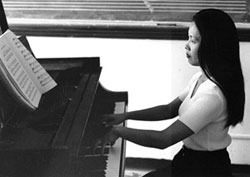
With additional faculty being recruited and long-term plans to expand performance facilities, the Conservatory is poised to continue its tradition of artistic and academic excellence. Looking to the future, Hager says, "my own personal view is that this is one of the most exciting times in terms of what is happening in music. Up until about 100 years ago, most musical traditions existed in isolation from one another. There was the Western European tradition and Western European composers communicated with each other and knew about each other's music but didn't know much about the music of Africa or China or Japan. But today, you go into a record store or you talk to someone that goes to concerts and you see that those barriers have broken down. You can go to Lincoln Center and see Ravi Shankar play the classical music of India, or you can see Wynton Marsalis in a jazz program, or you can see a group that plays music from the Renaissance or the medieval period. There is so much music for everyone to experience. I have been struck by interviews with contemporary musicians and composers and how they are involved in experiencing this rich variety of music...I think more musicians see themselves as being cross-over musicians and do not identify themselves in a narrow track. Someone like trumpeter Wynton Marsalis is probably as influenced by the music of classical composers as he is by jazz traditions. At the Conservatory, we recognize and foster this and encourage our students to explore it." |
Brooklyn College Web Site
Copyright © 1999, 1998 Brooklyn College.
All Rights Reserved.